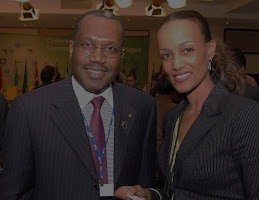- Connectivity of all the RECs to promote networking activities via Internet / Intranet /Extranet
- Facilitate cross-border knowledge sharing and research partnerships with key knowledge end-users.
- Development of integrated databases and local content to support decision making and to link the public, private sector, and civic society to the RECs
- Reduce cost of communication and increase personal communication
- Enhance regional identity and global presence
- Link and participate with other existing professional knowledge networks and the regular programs of the ECA
- Generate demand-driven research relevant to practical policy issues
- Increase competitiveness and productivity
- Upgrade of equipment and training in the use of new information and communication technologies
- Development of an effective communication strategy to make known the work of RECs
Strategic Use of the Knowledge Network
RI promote sustainable growth
Historically, the African domestic market has been fragmented by high internal and external barriers. In 1991, the Abuja Treaty was adopted, establishing a timetable towards the creation of a pan-African Economic Community by the year 2015.
The existing Regional Economic Communities were to be the foundation. This is an ambitious objective, but the first building block must be the creation of free trade areas that can be the foundation for wider economic integration at the regional and continental level.
There are huge challenges posed by the proliferation of regional economic groupings and protocols across the continent, characterised by overlapping membership.
However, progress has been made in the past decade. Most regions have now adopted a common external tariff structure (usually involving no more than three to four bands) – the most recent example being the EAC in January 2005 – while some, including CEMAC, WAEMU and member countries in COMESA, have also removed custom duties among themselves.
Recent ECA estimates that welfare gains from regional integration in sub-Saharan Africa alone, could be of the order of US$1.2 billion, reinforcing the view that Africa’s own liberalisation offers major gains.
The existing Regional Economic Communities were to be the foundation. This is an ambitious objective, but the first building block must be the creation of free trade areas that can be the foundation for wider economic integration at the regional and continental level.
There are huge challenges posed by the proliferation of regional economic groupings and protocols across the continent, characterised by overlapping membership.
However, progress has been made in the past decade. Most regions have now adopted a common external tariff structure (usually involving no more than three to four bands) – the most recent example being the EAC in January 2005 – while some, including CEMAC, WAEMU and member countries in COMESA, have also removed custom duties among themselves.
Recent ECA estimates that welfare gains from regional integration in sub-Saharan Africa alone, could be of the order of US$1.2 billion, reinforcing the view that Africa’s own liberalisation offers major gains.
.jpg)








